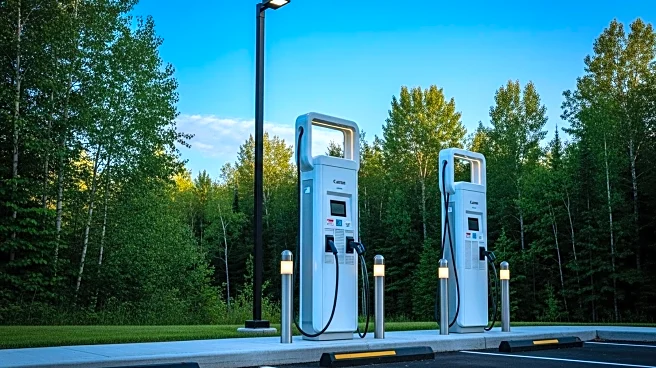What is the story about?
What's Happening?
Faith Technologies Incorporated (FTI) is set to install four high-speed electric vehicle (EV) charging ports in Rhinelander, Wisconsin. This development is significant for the area, which currently lacks sufficient public EV charging infrastructure. The installation aims to reduce 'range anxiety' among EV drivers by decreasing the distance between existing chargers. Rhinelander, a hub of industrial, commercial, and recreational activity, will benefit from these new charging stations, which are funded by the Wisconsin Electric Vehicle Infrastructure (WEVI) Program. This program utilizes NEVI Formula Program funds to expand EV charging across the state, covering up to 80% of project costs with federal funding. The new charging ports will be located near the state-designated Alternative Fuel Corridor along U.S. Highway 8, enhancing accessibility for travelers.
Why It's Important?
The installation of high-speed EV charging ports in Rhinelander is crucial for promoting electric vehicle adoption in areas with limited infrastructure. By reducing range anxiety, these chargers can encourage more drivers to switch to electric vehicles, supporting environmental sustainability and reducing reliance on fossil fuels. The project aligns with broader state and federal efforts to expand EV infrastructure, which is essential for meeting climate goals and transitioning to cleaner energy sources. Local businesses, such as the iconic Culver's restaurant, may also benefit from increased traffic as EV drivers stop to charge their vehicles, potentially boosting the local economy.
What's Next?
Following the installation, Rhinelander will have the fastest DC charging option in the area, with the nearest alternative being 26 miles away in Minocqua. As EV adoption grows, further expansion of charging infrastructure may be necessary to accommodate increased demand. Stakeholders, including local government and businesses, may explore additional funding opportunities to continue developing EV infrastructure. The success of this project could serve as a model for other rural areas seeking to enhance their EV charging capabilities.
Beyond the Headlines
The expansion of EV charging infrastructure in Rhinelander highlights the growing importance of sustainable transportation solutions in rural areas. This development may prompt discussions on the ethical and environmental responsibilities of communities to support clean energy initiatives. Additionally, it underscores the need for equitable access to EV technology, ensuring that rural and underserved areas are not left behind in the transition to electric vehicles.















